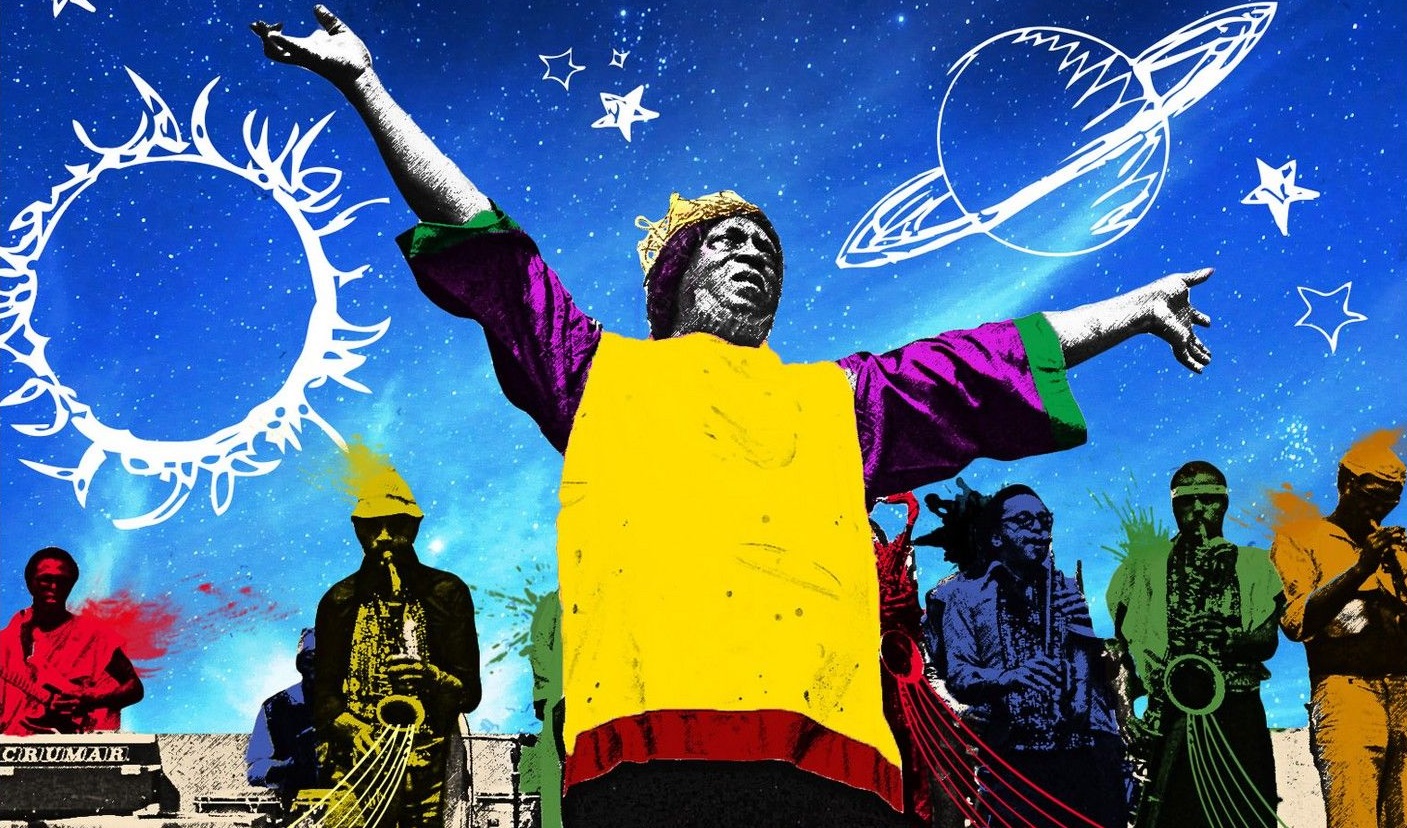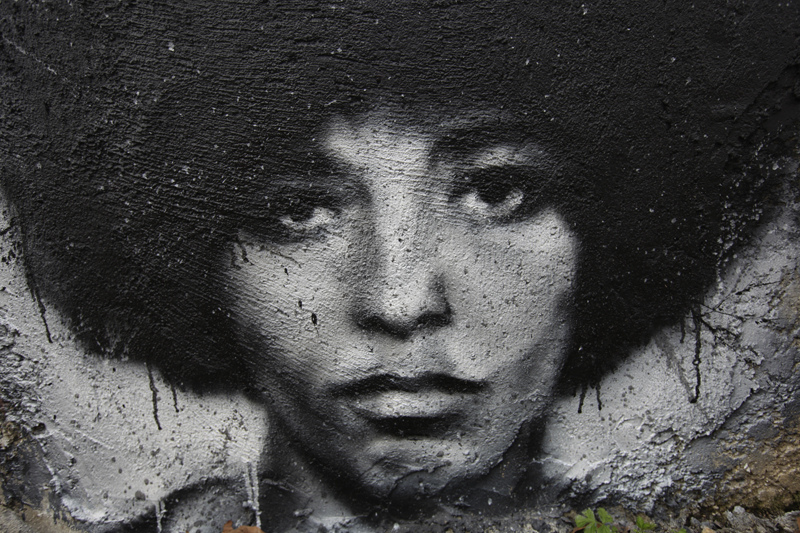Sun Ra Speaks About the Trial of Angela Davis

Anthony Reed, in his recent article on the grammar of utopia and freedom in the music of jazz performer Sun Ra, argues that we must be mindful of how dreams of future liberation can just as easily reproduce the systems of domination we wish to escape. Sun Ra makes this contradiction abundantly clear in an audio recording of an interview I recently found in which he shares his thoughts on the trial of Black political activist Angela Davis.
“Arriving” on earth under the name Herman Poole Blount, jazz musician Sun Ra denied any earthly bonds and made claims that he was “another order of being” sent to earth by the creator. His experiences in Jim Crow Birmingham, Alabama, and post-World War II Chicago fueled his investigations of Black history. Ra infused his knowledge of Black history with the iconography of Egypt and tropes of space travel to formulate his unique brand of Black speculative fiction known today as Afrofuturism. At the heart of Ra’s futuristic vision was the idea that Black people could find social liberation by embracing space travel and building a new social world in the blackness of outer space. This worldview reached its apex during the late 1960s and early 1970s when Ra began to tour widely and merge music, performance, dance, and visuals into his concerts. These spectacles became known as “myth-rituals.”1
Ra’s persona, music, and poetry suggest a disconnect between him and the wider political movements of the era such as Black Nationalism and third-world liberation, but that’s not fully the case. While Ra might seem disconnected from the politics of the era, individuals associated with the Black Arts Movement were acutely aware of and intimate with Ra’s work. One piece of evidence that articulates a link between Ra and the politics of this era is his 1972 film Space is the Place. The film mixes concert performances, dream-like fantastical sequences, and a narrative set in contemporary Oakland where Ra recruits select Black individuals to accompany him on a voyage to outer space to colonize an unnamed planet. A key scene occurs inside a Black youth center festooned with images of Black political activist Angela Davis and Black Panther Party leaders Eldridge Cleaver, H. Rap Brown, and Huey P. Newton. Upon Sun Ra’s arrival in the youth center, the young men and women question Ra whether he is real and criticize his Afrofuturist dress. Ra responds that he is not real, but rather, like the youth center patrons, a myth that does not exist in the global ordering of race and citizenship. If Black people were real, in Ra’s estimation, they would not need to fight for civil and social equality.
Ra’s exchange with the Black youth puts on full display the contrast between Ra’s intergalactic politics and the Black Nationalism of Brown, Cleaver, Davis, and Newton. Ra, in his Afrofuturist dress and surrounded by pictures of the Black Panther Party’s leadership in the city most commonly associated with the Party and a political activist associated with the larger struggle for freedom, presents an alternative to nationalist and cultural identity politics. Black freedom did not need to rely on integration into earth-based political structures or investing in an identity defined by hairstyles or clothing. Rather, Ra suggests to the Black youth that a new mode of Black life exists in the outer depths of space. Ra takes the opportunity to remind the young Black men and women that if previous forms of Black activism had been successful, they would not be seen, like him, as a myth, but rather included in the political and social structures of earth. Ra’s critique of Black political and social realities through wordplay and metaphor suggest an ambivalence towards the intellectual labor and political activity of this period. However, Ra’s comments about the incarceration and trial of Angela Davis in this recently discovered interview suggest that the Black intellectual labor and political activity of this period was on Ra’s radar beyond just a visual counterpoint to his Astro-Black philosophy or as a way to remind people of the superiority of his ideas.
I encountered the convergence of Sun Ra’s and Angela Davis’s intellectual streams in the Sun Ra/El Saturn Collection, which is comprised of over 600 audio tapes of master recordings, rehearsal tapes, and audio ephemera collected by Ra’s longtime business manager, Alton Abraham. These materials from Ra’s career reside in the basement of a warehouse converted into a recording studio dedicated to the “creative exploration of sound” that lays at the intersection of Chicago’s historically Swedish American neighborhood and LGBTQ+ community. It was here that I heard Ra voice his thoughts about Davis’s trial.
The tape in question is an interview of Ra by two anonymous individuals recorded either in the fall of 1972 or the spring of 1973. The interviewers ask Ra superficial questions about his ideas on history, his connection to historical Black styles of musical performance, and the importance of music in the Space Age. In his response to this last topic, Ra suggests that human life can only think of something once someone, or something else has suggested the possibility of said idea. Ra, ever the consummate self-promoter, believed he was the first to explore the idea of the Space Age in his music and poems, thus opening the door for the white race to “realize that well yeah, I can do that now because someone is talking about it.” In other words, Ra and his ideas were the catalyst for humans to travel towards and explore space. Ra seamlessly transitions away from this topic to his thoughts about Angela Davis. Ra views Davis’s acquittal and release as another example of this logic. Ra recounts how he informed individuals in Philadelphia that if only someone Black and sincere would speak out in Davis’s defense, then the creator would set her free. Thus, the all-white jury’s verdict of “not guilty” was only possible because Ra first put forth the notion that Davis would be exonerated. With this statement, Ra single-handedly positioned himself as the sole arbiter of Davis’s freedom while also dismissing the work of her legal team and the transnational grassroots activism that led to her acquittal.

Ra’s logic turned misogynistic as he continued speaking about Davis’s trial. For Ra, Davis’s incarceration was an example of men “ganging up” on a woman whose beliefs they disagreed with and offered further proof to his belief that “men are supposed to protect women.” Even though he was defending Davis, Ra articulated a male-centric hierarchy that positioned women as unequal to men while reaffirming a view that men must shield women from attacks. Whether these attacks were physical, emotional, or intellectual is unclear, but Ra’s views reinforced a worldview in which women need protection.
Ra further declared that any anger about Davis’s Marxist-inflected politics should be steered away from her and instead directed towards the men who taught her these leftist ideologies. Ra discounted Davis’s political agency by suggesting that she was merely a vessel for socialist political thought and her own experiences or intellectual labor had no role in shaping her political beliefs. It is unclear whether Ra was upset with Davis’s revolutionary politics or her male teachers, but Ra’s words inflicted damage regardless. Ra reinforced a phallocentric hierarchy, while also dampening one of the most prominent political voices of the era. In discounting Davis’s political stances, Ra shattered any sense of Pan-African solidarity from his perspective. In other words, Ra’s freedom dream of intergalactic travel was the only political stance he viewed as having any currency.
This interview extract provides fascinating insight into Ra’s thoughts and, in particular, his ideas about Angela Davis and her trial. On one level, the tape strengthens our understanding of Ra’s engagement with Black political activity during the early 1970s. Despite his intergalactic persona, Ra was aware of and thought about nationalist-based Black political activity during this era. On another level, the interview exposes the inherent contradictions of Ra’s space-bound liberation. In a singular statement, he discounted the political activism of one of the era’s most prominent thinkers and the collective effort to free her. Though Ra spoke of Blackness and salvation on a global scale, his comments made clear that he saw no room for other modes of Black liberation except his own.
Ra’s comments provide a reminder of the challenges involved in recovering the histories of Black liberation. Ra’s words reinforce why gender-centered readings of Black liberation movements, such as those by Ashley Farmer, Keisha N. Blain, Robyn Spencer, as well as Harvard University’s recent acquisition of Angela Davis’s papers are so important. These works and this archival collection are part of a larger effort to tell “a less male-dominated, top-down story about the Black Power movement and the left in general.” In Ra’s hands, Black liberation remains a phallocentric effort—one that diminishes women-led efforts or collective solidarities. To this point, Ra’s comments reinforce the dangers of the patriarchal, enigmatic model of Black male leadership as outlined by Erica Edwards. This unpublished interview provides new context for understanding Ra’s politics, especially within the context of Black Power and Black Nationalism in the 1970s. Ra’s words force us to pause and reconsider whether the world he envisioned in the blackness of outer space would simply reproduce the systematic oppressions of the world he desired to escape.
- John Szwed, Space is the Place: The Lives and Times of Sun Ra (Da Capo Press), 256 ↩

Sun Ra, like so many artists of inter galactical genre of music, was truly in outer space. I loved his music, and saw it’s relevance in that it spoke more to the times than did his phaliocentric thoughts, which, really, he could have kept to himself, and just played his music.